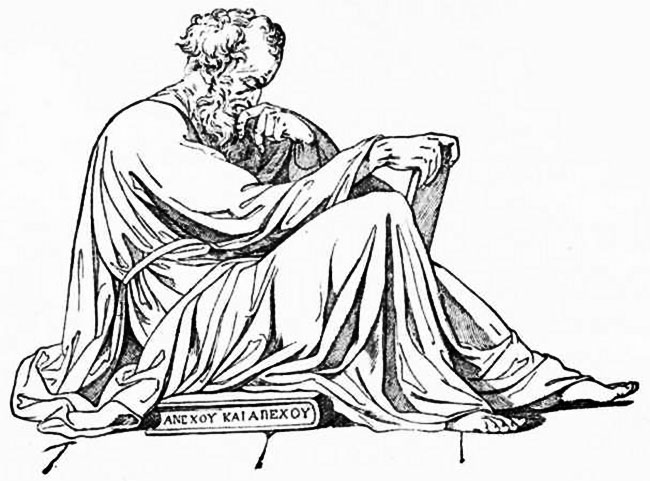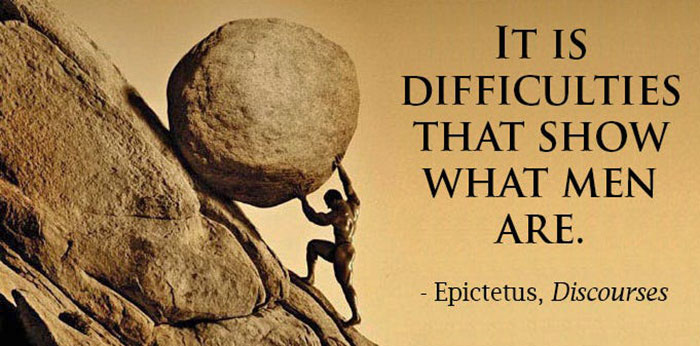|

by Edward Whelan
July 21, 2025
from
ClassicalWisdom Website

|
What does it really
mean to be free?
Today, freedom is often wrapped up in choice, such as
where we live, what we buy, what we say online.
We
are prone to view it in superficial and tangible terms,
things outside ourselves...
But
for Epictetus, a man born into bondage around 55 AD in
the Roman Empire, freedom had nothing to do with
external circumstances.
Freedom was the ability to control your own mind, your
judgments, and your actions.
Indeed, Epictetus describes a scene where a slave holds
back a sneeze while his master gorges himself greedily,
and asks who really has control?
So today we'll investigate what is truly freedom, and
how it can be achieved, according to Epictetus.
Anya Leonard
Founder and Director
Classical Wisdom |
Stoicism was one of the most
influential schools of thought in the ancient world - and
remarkably, its influence still resonates today.
From military strategy to modern
psychology, Stoic ideas continue to shape how we think about
life, virtue, and resilience...
Among its greatest voices stands
Epictetus, a man born into
bondage who went on to become one of the clearest and most practical
minds in the history of philosophy.
The Life of a Stoic
Epictetus was born around 55 AD in Phrygia, in what is now southern
Turkey.
At some point in his early life, he became a
slave. Records suggest he was owned by
Epaphroditos, a wealthy and
powerful freedman in the court of Emperor Nero.
Although a former slave himself, Epaphroditos
held great sway in Roman society... an irony not lost when we
consider Epictetus' later views on true freedom.
According to one story, Epictetus was
crippled by a cruel master.
Others say he was born with a disability.
Either way, he walked with crutches and bore
a physical reminder of life's harshness.
Yet, despite his lowly status, Epaphroditos
allowed Epictetus to study under the Stoic philosopher
Musonius Rufus.
When his master died, Epictetus was freed and
began teaching philosophy himself.
His timing, however, was not ideal.
In 93 AD, Emperor Domitian expelled
philosophers from Rome, forcing Epictetus into exile. He settled in
Epirus, in northwestern Greece, and established a school that soon
attracted students from across the empire. Even emperors were said
to seek his counsel.
Though admired by the elite, Epictetus lived modestly.
He shunned wealth, status, and comfort,
preferring to be alone, surrounded not by riches but by reason.
The Stoic Message
What made Epictetus' philosophy so powerful wasn't just his
clarity:
it was his insistence that philosophy had to
be lived, not just studied.
His teachings, preserved by his student Arrian
in the
Discourses and the
Enchiridion, center on one core
idea:
Know what is within your power, and let go of
what is not.
He writes:
"Some things are in our control and others
not.
Things in our control are opinion, pursuit,
desire, aversion, and, in a word, whatever are our own actions.
Things not in our control are body, property,
reputation, command, and, in one word, whatever are not our own
actions."
Epictetus
Enchiridion
It's a deceptively simple advice.
Focus only on what you can change:
your thoughts, your choices, your actions.
Accept everything else as fate...
For Epictetus, this wasn't passive resignation...
it was a call to develop inner strength.
We cannot control the role we're given in
life, but we can choose how we play it...
To live in harmony with nature and reason is to
live in accordance with the divine order.
This belief in a rational cosmos, where each person has a role,
formed the heart of his ethical vision.
If we respond to life with reason rather than
emotion, we rise above misfortune.
If we master our inner world, we are truly
free - regardless of our outer circumstances.
"You may be unconquerable," he said, "if
you enter into no combat in which it is not in your control
to conquer."

Philosophy in Practice - The Three
Disciplines
Epictetus was not interested in abstract speculation or clever
metaphysics.
For him, philosophy was a tool, a way to live
better, to suffer less, and to become truly free.
Ideas alone were not enough.
Wisdom had to be lived, tested, and
practiced.
To that end, he outlined three essential
disciplines that formed the backbone of Stoic training.
These weren't just mental exercises; they were
guides for daily life, a way of aligning thought and action with
nature and reason.
The Discipline of Desire
At the heart of this discipline is a simple but powerful
insight: not everything we want is worth wanting.
According to Epictetus, true peace comes when
we learn to desire only what is good, meaning, what is virtuous
and within our power.
Craving things we can't control, whether it's
fame, fortune, or someone else's approval, only invites
disappointment and inner turmoil.
A wise person learns to trim their desires to
fit the shape of reality, not the other way around.
The Discipline of Action
Next comes the question of how we live in the world.
While we cannot dictate outcomes, we can
choose how we act. Epictetus urged his students to act with
purpose, guided not by the promise of results but by the
integrity of their intentions.
Whether in daily chores or public duties,
it's not success or failure that defines us; it's whether we
remain faithful to our values.
Right action, not perfect results, is the
aim.
The Discipline of Assent
Finally, there is the matter of judgment; how we interpret what
happens to us.
Events themselves are neutral, but the
meaning we give them can lift us up or weigh us down. Epictetus
taught that we must be cautious with our first impressions.
An insult, for instance, is only harmful if
we agree that it is.
Mastering the discipline of assent means
pausing before we react, examining our thoughts, and choosing
which ones deserve our agreement.
In doing so, we gain control not only of our
responses, but of our inner life.
Lasting Influence
Epictetus' legacy is far-reaching.
Many believe he crafted the most practical and
coherent version of Stoicism. His ideas profoundly influenced
Marcus Aurelius, the
philosopher-emperor whose
Meditations
still guide leaders and thinkers today.
The Enchiridion was translated into Latin during the
Renaissance and embraced by Christian humanists who found it
surprisingly compatible with their faith.
Thinkers like Pascal and Descartes
admired his clarity, and his work has inspired generations of
soldiers, scholars, and psychologists alike.
In fact,
Cognitive Behavioral Therapy, a
cornerstone of modern mental health care, owes much to Epictetus'
insights on belief, emotion, and control.
But perhaps his greatest legacy is the message
that,
freedom isn't granted by others or dictated
by circumstance.
It lies within...!
Epictetus, once a slave, became one of history's
most powerful advocates for self-mastery.
He taught that the path to true liberation
doesn't begin with political revolution or material success... it
begins with the mind.
"But, for your part, don't wish to be a
general, or a senator, or a consul, but to be free; and the only
way to this is a contempt of things not in our own control."
In a world still chasing power, status,
and control, Epictetus reminds us that the most
important conquest is the one within...
|



